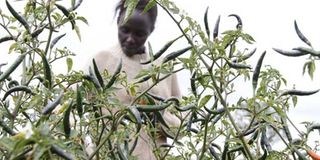Pepper spreads joy where maize is failing

A worker harvests peppers at the Rupa fruits and vegetables farm in Ilula, Eldoret, on November 15, 2014. PHOTO | JEFF ANGOTE | NATION MEDIA GROUP
What you need to know:
- Depending on the climate conditions of an area, the crop takes between two to six weeks in the nursery before it is transplanted. It takes longer to sprout and grow in cold areas.
Most farms in Uasin Gishu County are currently fallow after farmers harvested their maize and wheat.
The large tracts of land are littered with maize stalks as farmers wait for the next planting season in March.
One farm, however, stands out. Situated in Ilula north of Eldoret town, Rupa Fruits and Vegetables Farm is lush green, not with maize but pepper.
Favoured by the good climatic conditions, the crop spread on four acres owned by Ajay Shah is doing well.
“We started growing pepper as an experiment to see if it will perform well but it has not let us down. Initially we were growing maize but the prices were too low to make any meaningful profit.”
Shah grows Tabiche chilli pepper (which turns red when mature) and Carolina cayenne (green) varieties, which he sells to factories and supermarkets at Sh350 a kilo.
“The (climate conditions) in the region is favourable for pepper production. The crop needs adequate rainfall and warm temperatures. The soil should have good drainage and a pH of between 5.5 to 6.0. Spacing between rows is usually about 3 feet apart.”
HARDY CROP
Shah adds the crop does not need much fertiliser and is rarely attacked by diseases.
To plant the crop, Shah first grows the seeds in a nursery where they stay for about two weeks before he transplants them to the farm. The crops take two months to mature before harvesting starts.
They harvest the red varieties twice a week and green ones four times. In a week, they harvest 900kg from the four acres. The harvesting goes on for about a year making the crop profitable.
Manager Wilson Cheruiyot says the farm employs 45 people, a majority of them as harvesters, while the rest are supervisors.
The green pepper is packed in small packages and sold in supermarkets in Nairobi, Eldoret and other major towns while the red variety is sold to companies that make chilli sauce.
“We are changing the way we do farming in this part of the country. We have identified some farmers that we have contracted. We give them free pepper seedlings for planting and after they harvest, they sell to us at Sh70 a kilo.’’
“This has motivated some farmers around here to embrace horticulture since the returns are better compared to the usual maize and wheat that they have been planting for a long time,” he adds.
NO INSECTICIDES
The government is currently buying a 90kg bag of maize at Sh2,300. Farmers are unhappy with the price because they had expected to sell a bag for Sh3,000.
Patrick Ndehero, a crop technologist at the Kenya Agricultural and Livestock Research Organisation, says the crop does well in wet but warm areas.
“Areas like Nakuru, Naivasha, Subukia, Eldoret, Rongai and others in the Rift Valley are suitable for the crop.”
Depending on the climate conditions of an area, the crop takes between two to six weeks in the nursery before it is transplanted. It takes longer to sprout and grow in cold areas.
“While some farmers may sell their produce as fresh, it is advisable to add value by drying pepper and grinding it. This way, you will be able to preserve the produce for long as you source for the market from food-processing industries, supermarkets and hotels.”
Pepper does not need a lot of chemicals to do well unlike many horticultural crops, according to Ndehero.
“The plant produces some chemicals that repel insects, therefore, one will not need insecticides. The chemicals also guard pepper against diseases and all a farmer needs is use organic manure for the crop to perform optimally.”
Additional reporting by Rachel Kibui





